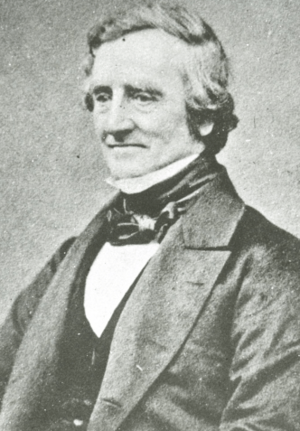James Watson (radical) facts for kids
Quick facts for kids
James Watson
|
|
|---|---|
 |
|
| Born | 21 September 1799 |
| Died | 29 November 1874 (aged 75) |
| Occupation | Chartist, radical publisher, writer |
James Watson (born September 21, 1799 – died November 29, 1874) was an important English publisher and activist. He was known for being a "radical," meaning he wanted big changes in society. He was also a Chartist, a group that fought for more rights for ordinary people in Britain. He worked with other famous activists like Henry Hetherington and William Lovett.
Contents
Growing Up: James Watson's Early Life
James Watson was born in Malton, North Yorkshire, on September 21, 1799. His father passed away when James was just one year old. His mother, who taught Sunday school, taught him how to read and write. Around 1811, his mother started working for a clergyman. This clergyman helped pay for James's schooling for a short time. James worked as a gardener and house-servant there. He spent a lot of time reading many different books. By 1817, James and his mother were living in Leeds, where he worked in a warehouse.
Moving to London: A New Path
In London, James Watson became interested in "freethought" and radical ideas. Freethought means thinking for yourself, especially about religion and society. He was inspired by writers like William Cobbett and Richard Carlile. James helped spread Carlile's writings. In 1821, Carlile was sent to prison for three years. So, in 1822, James went to London to help out in Carlile's bookshop.
Facing Challenges: Watson's Imprisonment
In 1823, James Watson was charged with selling a book called Principles of Nature. This book had ideas that the government didn't like. He defended himself but was sent to Coldbath Fields Prison for a year. While in prison, he read many books. These books helped him form his own strong opinions. He became even more against traditional religious views and supported a republic, where people choose their leaders.
After prison, in 1825, he learned to be a typesetter. This skill helped him print books. He even printed Carlile's newspaper, The Republican. James started his own business. He faced tough times and even got sick with cholera in 1826. After getting better, he joined the "Owenites." These were people who believed in creating communities where everyone worked together. In 1828, he worked at a co-operative store in London.
Becoming a Publisher: Sharing Ideas
In 1831, James Watson started his own printing and publishing business. He became a strong supporter of the right to free expression of opinion. This means people should be allowed to share their ideas freely. A supporter named Julian Hibbert left him money in 1834. This money helped James buy more printing equipment.
Books for Change: What Watson Printed
James started by printing the works of Tom Paine, a famous writer who supported new ideas. He also printed other important books like Mirabaud's System of Nature and Ruins by Volney. He even printed poems by famous writers like Lord Byron (Cain and The Vision of Judgment) and Percy Bysshe Shelley (Queen Mab and The Masque of Anarchy). James did a lot of the work himself, from printing to sewing the books. He made sure his books looked good, even if he didn't make much money from them.
More Arrests: Fighting for Freedom
In 1832, James Watson was arrested. He had organized a procession and a feast on a day the government called for a "general fast" because of a cholera epidemic. He avoided prison that time. But in 1833, he was sent to Clerkenwell prison for six months. His crime was selling a newspaper called Poor Man's Guardian, which the government didn't approve of.
He married Eleanor Byerley on June 3, 1834. Just two months later, he was arrested again. He was imprisoned for six months for selling another "unstamped" paper. These papers didn't have a special government stamp, which made them illegal. He was also watched by the government because he supported the Dorchester labourers. These were workers who were punished for trying to form a union. This was his last time in prison. However, he kept printing books that the government had banned.
Joining the Chartists: Fighting for Rights
In 1837, James Watson joined the committee that wrote the demands for the Chartist movement. The Chartists wanted more rights for working people, like the right to vote for all men. James did not agree with some Chartists who wanted to use violence. He also didn't want to make deals with politicians who might not truly support the people's cause. He believed in fighting for the people's "birthright" – their basic rights.
James Watson also connected with other activists around the world. He wrote to Giuseppe Mazzini, an Italian revolutionary. In 1847, he joined Mazzini's Peoples' International League. In 1848, he helped organize a public meeting to celebrate the French Revolution of 1848. This revolution showed that people could make big changes.
Later Years: A Free Press
In his later years, James Watson's main goal was to have a completely free press. He wanted newspapers and books to be printed without any taxes or government control. He passed away on November 29, 1874, in Lower Norwood. He was buried in Norwood cemetery. His friends put up a grey granite monument to remember his "brave efforts to secure the rights of free speech."
 | Jessica Watkins |
 | Robert Henry Lawrence Jr. |
 | Mae Jemison |
 | Sian Proctor |
 | Guion Bluford |

